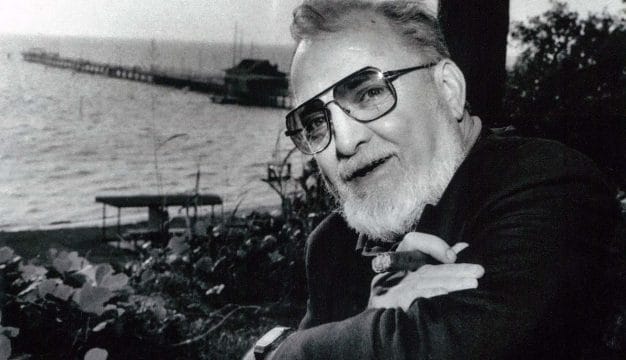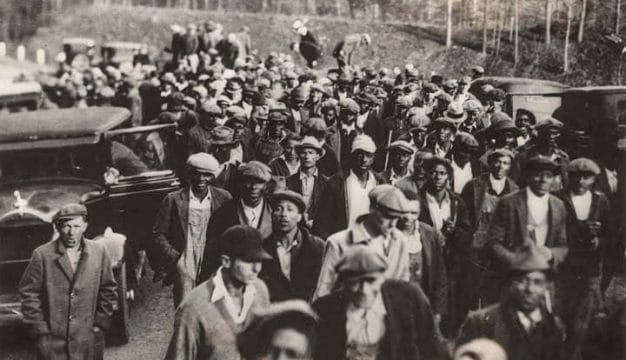William Flynt Nichols
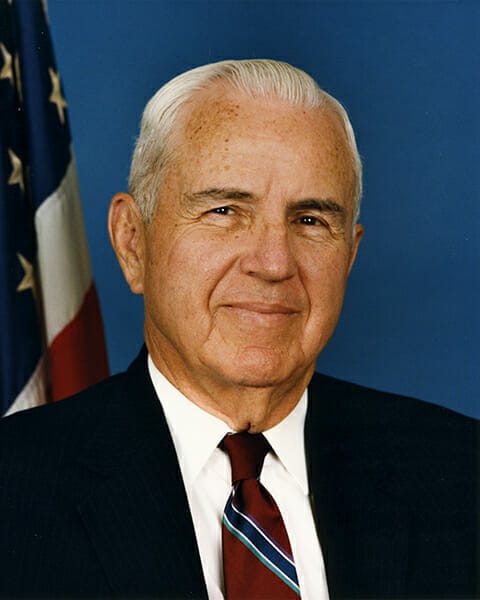 William F. Nichols
William “Bill” Flynt Nichols (1918-1988) served in the U.S. House of Representatives as a Democrat for two decades. A decorated war veteran, civic leader, businessman, and Alabama state legislator before his congressional service, Nichols was known for his dedication to military veterans and defense policy and for co-authoring the Goldwater-Nichols Act of 1986, which reformed the U.S. military command structure. Nichols also served two terms on the board of trustees of his alma mater, Auburn University.
William F. Nichols
William “Bill” Flynt Nichols (1918-1988) served in the U.S. House of Representatives as a Democrat for two decades. A decorated war veteran, civic leader, businessman, and Alabama state legislator before his congressional service, Nichols was known for his dedication to military veterans and defense policy and for co-authoring the Goldwater-Nichols Act of 1986, which reformed the U.S. military command structure. Nichols also served two terms on the board of trustees of his alma mater, Auburn University.
Nichols was born on October 16, 1918, on a small farm near the Mississippi town of Becker to William Francis Nichols and Daisy Beatrice Williams. He had one sibling, a brother. Several months after his birth, the family moved to Sylacauga, Talladega County, where Nichols grew up and would later make his home. His father was a vocational agriculture teacher at and later principal of Sylacauga High School. During his youth, Nichols worked summers in the local textile mill and in a grocery store. He played football for Sylacauga High and after graduating in 1935 entered the Alabama Polytechnic Institute (API; now Auburn University) in Auburn, Lee County, on a football scholarship.
At API, Nichols majored in agriculture, participated in military officer training, lettered three years in football, and was named captain of the 1940 Tigers football team. Nichols earned his bachelor’s degree agronomy in 1939 and went on to earn a master’s degree in agronomy in 1940. The title of his master’s thesis was “A Study of the Effects of Various Treatments on the Rooting and Survival of Kudzu Seedlings and Vine Cuttings.” After college, Nichols took a position with the Alabama Agricultural Extension Service as a farm agent in Autauga County, mostly advising area farmers and counseling 4-H clubs.
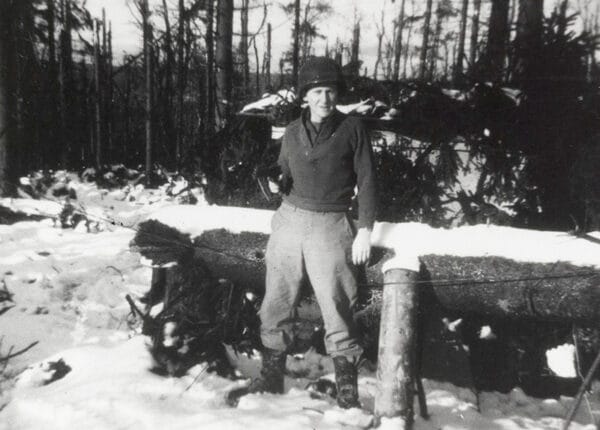 William Nichols, 1945
Nichols entered the U.S. Army in 1942 as a second lieutenant during World War II. The following year, he married Maude Carolyn Funderburk, with whom he would have two daughters and one son. While in the army, he served as a gunnery officer in the Eighth Infantry Division, which landed in France almost a month after the Allied invasion to take part in the Normandy Campaign, the capture of Brest, and the advance into Germany. On November 10, 1944, Nichols was critically wounded by a mine in the Battle of Hürtgen Forest in Germany, one of the costliest American battles in Europe. As a result of his combat wounds, his left leg was amputated above the knee. He was awarded the Bronze Star and the Purple Heart as well as three major battle stars. In 1947, he retired from the army at the rank of captain.
William Nichols, 1945
Nichols entered the U.S. Army in 1942 as a second lieutenant during World War II. The following year, he married Maude Carolyn Funderburk, with whom he would have two daughters and one son. While in the army, he served as a gunnery officer in the Eighth Infantry Division, which landed in France almost a month after the Allied invasion to take part in the Normandy Campaign, the capture of Brest, and the advance into Germany. On November 10, 1944, Nichols was critically wounded by a mine in the Battle of Hürtgen Forest in Germany, one of the costliest American battles in Europe. As a result of his combat wounds, his left leg was amputated above the knee. He was awarded the Bronze Star and the Purple Heart as well as three major battle stars. In 1947, he retired from the army at the rank of captain.
After his military service, Nichols and his wife Carolyn returned to the Sylacauga area, where he took a position with the Parker Fertilizer Company. He would rise to the position of vice president there and then to president of the associated Parker Gin Company. Nichols was active in civic affairs, serving on the local school board and on the Board of Stewards of Sylacauga’s First Methodist Church. He was a member of the Alabama Farm Bureau, Alabama Cattleman’s Association, and National Advisory Committee on Cotton. He served as president of the Alabama Crop Improvement Association, as director of the Coosa River Soil Conservation district, and as chairman of the Alabama Cotton Study Committee.
Nichols was elected to the Alabama House of Representatives in 1959 and then to the Alabama Senate in 1963. He served eight years in the Alabama legislature, where he chaired the committees on Military Affairs and Finance and Taxation. Nichols sponsored legislation to improve Alabama’s education system, including a bill that brought free school books to all the children of Alabama. For his work on this bill, he was named “Most Outstanding Member” of the Alabama Senate in 1965 by the capitol press corps. In addition, he sponsored legislation to provide assistance to disabled residents of the state and to improve farm communities’ access to markets. He also was a legislative leader and ally of Gov. George C. Wallace.
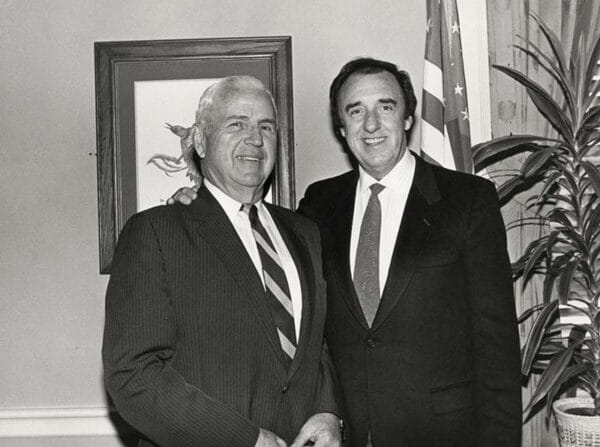 Jim Nabors and Bill Nichols
In the elections of 1966, Nichols handily defeated Arthur Glenn Andrews for the seat in the U.S. House of Representatives for Alabama’s Fourth Congressional District, which encompasses Autauga, Calhoun, Clay, Cleburne, Coosa, Dallas, Elmore, Randolph, St. Clair, and Talladega Counties. During his first term, Nichols served on the Agriculture Committee. After his reelection in 1968, he successfully petitioned the House leadership for a place on the House Armed Services Committee and would serve on this committee the rest of his congressional career. During his tenure, Nichols chaired panels on Non-Appropriated Funds, Commissaries and Exchanges and the Subcommittee on Military Personnel. While chair of the Compensation and Investigations subcommittee, Nicholson notably led inquiries into military overspending that led to press reports of wildly overpriced hammers, coffee pots, and other everyday items. In 1973, after congressional redistricting in 1972, Nichols won the Third Congressional District seat left vacant by Elizabeth B. Andrews, the first woman to represent Alabama in the U.S. Congress. That district encompasses Autauga, Calhoun, Chambers, Clay, Cleburne, Coosa, Elmore, Lee, Macon, Randolph, Russell, St. Clair, Talladega, and Tallapoosa Counties.
Jim Nabors and Bill Nichols
In the elections of 1966, Nichols handily defeated Arthur Glenn Andrews for the seat in the U.S. House of Representatives for Alabama’s Fourth Congressional District, which encompasses Autauga, Calhoun, Clay, Cleburne, Coosa, Dallas, Elmore, Randolph, St. Clair, and Talladega Counties. During his first term, Nichols served on the Agriculture Committee. After his reelection in 1968, he successfully petitioned the House leadership for a place on the House Armed Services Committee and would serve on this committee the rest of his congressional career. During his tenure, Nichols chaired panels on Non-Appropriated Funds, Commissaries and Exchanges and the Subcommittee on Military Personnel. While chair of the Compensation and Investigations subcommittee, Nicholson notably led inquiries into military overspending that led to press reports of wildly overpriced hammers, coffee pots, and other everyday items. In 1973, after congressional redistricting in 1972, Nichols won the Third Congressional District seat left vacant by Elizabeth B. Andrews, the first woman to represent Alabama in the U.S. Congress. That district encompasses Autauga, Calhoun, Chambers, Clay, Cleburne, Coosa, Elmore, Lee, Macon, Randolph, Russell, St. Clair, Talladega, and Tallapoosa Counties.
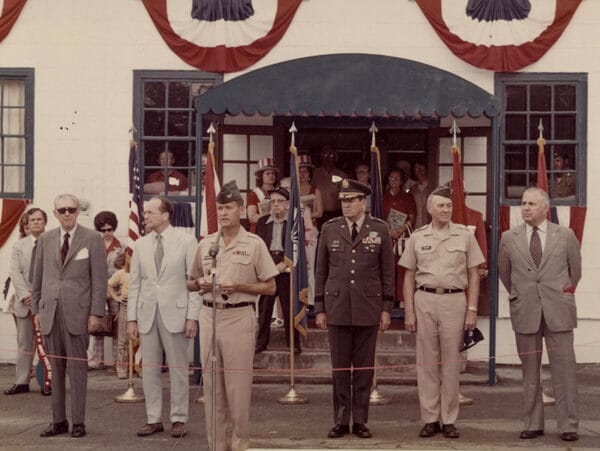 Bill Nichols at Anniston Army Depot
As chairman of the Military Personnel and Compensation Subcommittee in the 97th Congress in 1981, Nichols was recognized for his legislative initiatives aimed at improving the quality of life for military people. Nichols also sponsored legislation in the area of taxes, the environment, veteran’s benefits, and military authorization, but his most significant achievement was the Goldwater-Nichols Department of Defense Reorganization Act of 1986. The law was an attempt to correct problems with inter-service rivalry between the branches of the U.S. military. It restructured military organization and allowed U.S. commanders to exercise full control over Marine Corps, Army, Navy, and Air Force assets without having to negotiate with the individual services. It also ensured a better accountability of defense programs to the Executive Branch and to Congress. Nichols joined a number of legislative caucuses that reflected his interest in keeping the United States militarily strong, helping rural Americans, ensuring vigorous textile and steel industries, and promoting tourism in the South.
Bill Nichols at Anniston Army Depot
As chairman of the Military Personnel and Compensation Subcommittee in the 97th Congress in 1981, Nichols was recognized for his legislative initiatives aimed at improving the quality of life for military people. Nichols also sponsored legislation in the area of taxes, the environment, veteran’s benefits, and military authorization, but his most significant achievement was the Goldwater-Nichols Department of Defense Reorganization Act of 1986. The law was an attempt to correct problems with inter-service rivalry between the branches of the U.S. military. It restructured military organization and allowed U.S. commanders to exercise full control over Marine Corps, Army, Navy, and Air Force assets without having to negotiate with the individual services. It also ensured a better accountability of defense programs to the Executive Branch and to Congress. Nichols joined a number of legislative caucuses that reflected his interest in keeping the United States militarily strong, helping rural Americans, ensuring vigorous textile and steel industries, and promoting tourism in the South.
Nichols was active in veterans’ organizations, including the American Legion, the Veterans of Foreign Wars, and the Disabled Veterans of America. Nichols also was a member of the Auburn University Board of Trustees. Beginning in 1968, he served for two 12-year terms and in 1987 was elected as President Pro Tempore of the board. He was inducted in 1983 into the Alabama Academy of Honor in part for his support of the military installations in the state.
 Bill Nichols State Veterans Home
Nichols donated approximately 400,000 items from his congressional and personal papers to the Department of Special Collections and Archives of the Auburn University Libraries. The William F. Nichols Collection includes photographs, newspaper clippings, correspondence, and 400 pages of oral history transcripts documenting his life as a student athlete, soldier, businessman, state legislator, and congressman. Nichols died of a heart attack at his office in Washington, D.C., on December 13, 1988. He is buried in the Marble City Cemetery in Sylacauga. Glen Browder filled the vacant seat in a special election. Auburn University named its Reserve Officer Training Corps center after him in 1986 and the U.S. military recognized Nichols’ contributions by naming several facilities at the Anniston Army Depot in his honor. In 1989, the Alabama Department of Veterans Affairs named its state veteran’s home in Alexander City, Tallapoosa County, after Nichols, who helped secure funding for the the facility for the state.
Bill Nichols State Veterans Home
Nichols donated approximately 400,000 items from his congressional and personal papers to the Department of Special Collections and Archives of the Auburn University Libraries. The William F. Nichols Collection includes photographs, newspaper clippings, correspondence, and 400 pages of oral history transcripts documenting his life as a student athlete, soldier, businessman, state legislator, and congressman. Nichols died of a heart attack at his office in Washington, D.C., on December 13, 1988. He is buried in the Marble City Cemetery in Sylacauga. Glen Browder filled the vacant seat in a special election. Auburn University named its Reserve Officer Training Corps center after him in 1986 and the U.S. military recognized Nichols’ contributions by naming several facilities at the Anniston Army Depot in his honor. In 1989, the Alabama Department of Veterans Affairs named its state veteran’s home in Alexander City, Tallapoosa County, after Nichols, who helped secure funding for the the facility for the state.
Further Reading
- William F. Nichols Papers, 1935-1988, RG 194. Auburn University Libraries Department of Special Collections and Archives, Auburn, Alabama.
